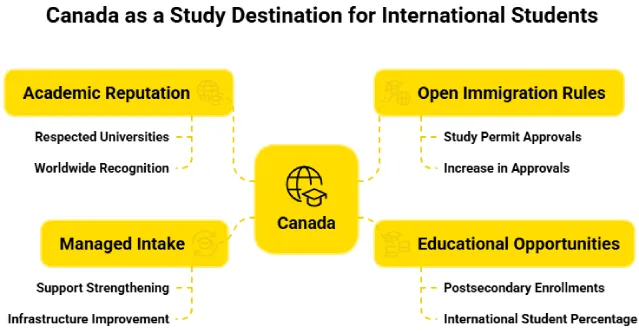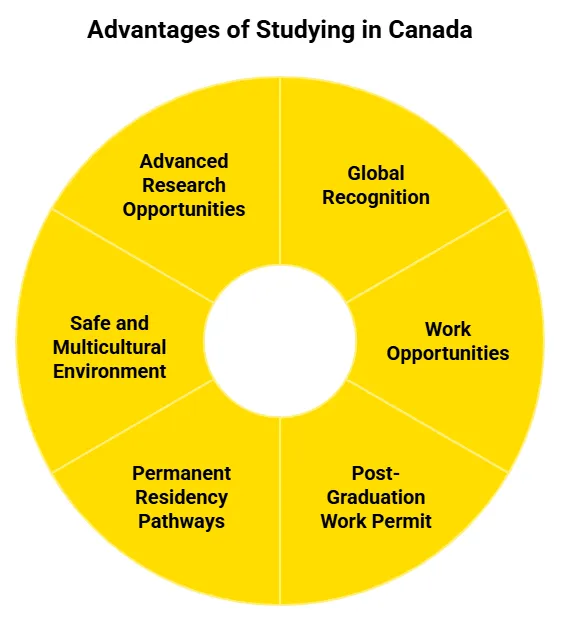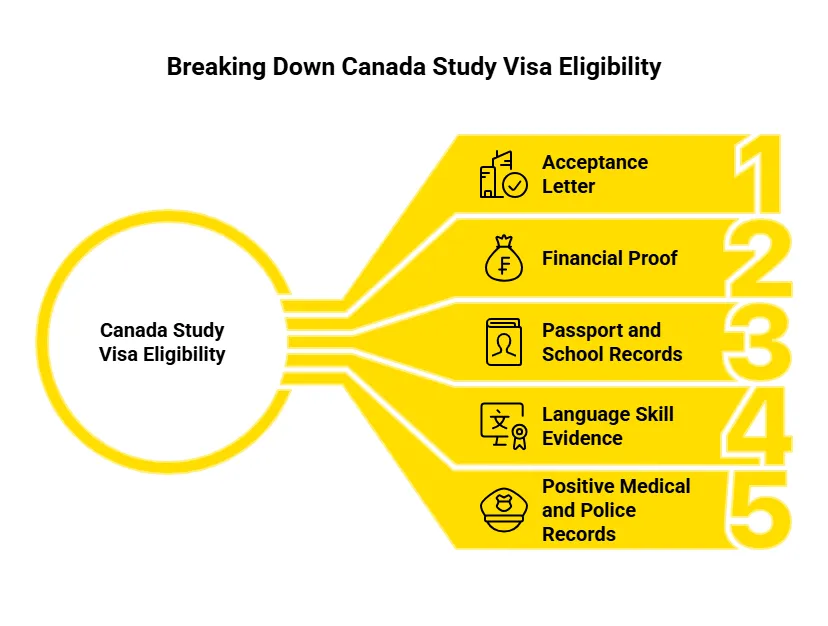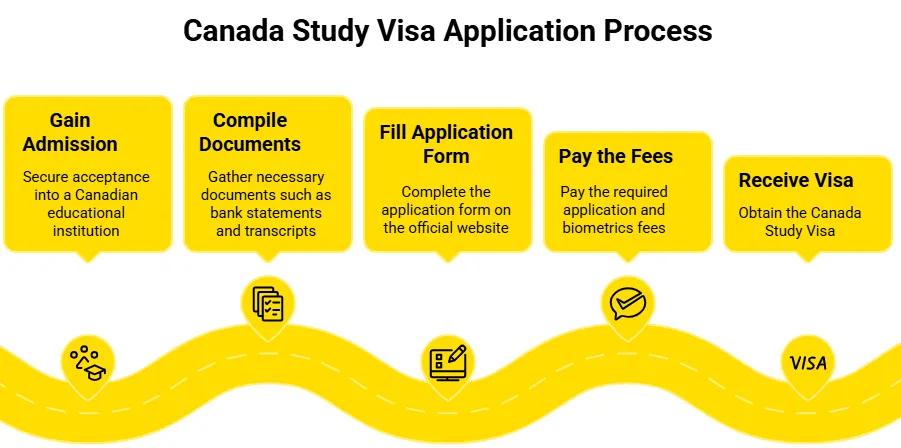Canada is a popular choice for UAE students because of its academic reputation, open immigration rules, and degrees recognized worldwide. The country provides educational opportunities and prospects for the future, hosting over a million international students at its respected universities.

*Want assistance to apply for Canada Student Visa? Sign up with Y-Axis for comprehensive support with the process.
Canada has announced its 2026 study program allocations and aims to admit 408,000 international students.
| Category | Allocated Study Permits |
|---|---|
| PAL/ TAL required applicants | 1,80,000 |
| Master’s and doctoral students (PAL/TAL exempt) | 49,000 |
| Primary and secondary school (kindergarten to grade 12, also PAL/TAL exempt) | 1,15,000 |
| Other PAL/TAL-exempt study permit applicants | 64,000 |
| Total | 4,08,000 |
For UAE students, Canada provides top-tier education, varied cultural experiences, and solid career prospects in a secure atmosphere.
A Canada Study Visa, or study permit, is a legal document that lets international people study at schools in Canada. It is not a visa, but it gives you the right to study full-time in Canada.
Students from the UAE who are accepted to a Canadian school need to apply for this permit before entering Canada. You might also get a visitor visa or an eTA with your study permit, based on your nationality, to help you enter Canada.
The study permit states the rules of your stay, like which school you can go to, what you can study, and how long your permit lasts. Often, you can work part-time while studying and full-time during breaks. To keep your permit active, you need to stay in school and do well in your classes.
The benefits of studying in Canada are given below.

Canadian institutions provide diverse academic paths, such as bachelor's, master's, diplomas, and doctoral degrees, fitting varied career objectives. UAE students have options from university degrees to college diplomas. Many programs integrate co-ops or internships, merging study with practical job experience.
In Canada, undergraduate studies often involve earning a bachelor's degree from a university or college. These programs usually take three to four years, depending on the province and what you're studying. You can build a solid base in fields like engineering, business, computer science, health, and the arts. A lot of schools here also have co-op programs, where you can get paid work experience as part of your degree.
Canadian postgraduate programs offer master's degrees, graduate diplomas, and graduate certificates. These usually take one to two years to finish. They are for those who hold a bachelor's degree and who wish to focus on areas like data science, business, engineering, or healthcare. A lot of the programs have research, internships, or co-op options for better hands-on training.
In Canada, diploma and certificate courses are career-oriented, short programs given by colleges and technical schools. Lasting from eight months to two years, these courses give practical skills and training for those wanting to quickly enter the workforce. They are liked by students from the UAE who want affordable schooling that leads to jobs in fields such as business, IT, hospitality, and healthcare.
In Canada, doctoral and other research-based degrees are in-depth academic programs that emphasize doing unique studies, usually taking 3 to 5 years to finish. Top research universities provide these degrees, where students must write a dissertation with guidance from a professor. Doctoral students often get money for school through scholarships, teaching jobs, or research funding. Graduates are prepared for jobs in teaching, study, or specific jobs in industries.
Canadian co-op and internship programs blend school with work. Students switch between classes and paid jobs in their field. Fields like engineering, business, computer science, and health sciences often provide these programs. Students can build skills, get Canadian work experience, and improve their job chances after school.
The eligibility criteria for Canada Study Visa are given below.

The documents required to apply for Canada Study Visa are given below.
Detailed information about the fees for Canada Study Visa is given below.
| Fee Type | Amount (in CAD) |
|---|---|
| Study Permit Application Fee | 150 CAD |
| Biometrics Fee | 85 CAD |
| Medical Examination (if needed) | Varies (approx. 100–200 CAD) |
| Police Clearance Certificate | Varies |
| Language Test (e.g., IELTS) | Approx. 1200–1500 AED |
| Document Translation/Notarization | Varies |
Detailed information about the processing time for Canada Study Visa is given below.
| Stage | Estimated Time |
|---|---|
| Document Preparation & Submission | 1 to 2 weeks |
| Biometrics Appointment | Within 1 week |
| Visa Processing by IRCC | 8 to 10 weeks |
| Total Estimated Processing Time | 10 to 12 weeks |
The process to apply for a Canada Study Visa is given below.
Step 1: Gain admission to a recognized educational institution.
Step 2: Compile the necessary documents, like bank statements and transcripts.
Step 3: Fill out the application form on the official website.
Step 4: Settle the required application and biometrics charges.
Step 5: Receive your Canada Study Visa.

International students in Canada can work part-time while studying and full-time during school breaks. No separate work permit is needed if they are full-time students at a Designated Learning Institution (DLI). They can work off-campus for up to 20 hours a week when classes are in session, which helps them get experience and cover costs. There's no limit to on-campus work hours, as long as the job is on the school's property.
If a program has required work placements, like co-ops or internships, students need to apply for a co-op work permit in addition to their study permit. Once they graduate, students who finish a program that's at least eight months long might be able to get a Post-Graduation Work Permit (PGWP). This lets them work full-time in Canada for up to three years, based on how long their program was.
The Post-Graduation Work Permit lets global students who finished an approved program at a Canadian school work full-time after they graduate. How long the permit lasts depends on the length of the school program, up to three years. So, finishing a two-year program usually means you can get a three-year work permit. This work permit is not tied to a specific job, so graduates can work for any boss in any job type anywhere in Canada.
Getting work experience through this permit is very helpful when applying for permanent residency in Canada. Graduates can apply for PR with different immigration options, like the Canadian Experience Class with Express Entry, or through Provincial Nominee Programs. If you went to school and worked in Canada, it helps you qualify and makes it more likely you'll be asked to apply for permanent residency. For many students from the UAE, this permit is a major move toward living in Canada for good.
Multiple scholarships are available from Canadian institutions and government organizations for international students. These scholarships are awarded based on merit, need, or specific research areas. Students from the UAE should apply early and check the financial aid office of their chosen university for scholarship opportunities.
| Scholarship Name | What It Covers |
|---|---|
| Lester B. Pearson International Scholarship (U of T) | Full tuition, books, incidental fees, and on-campus residence for four years |
| UBC International Major Entrance Scholarship (IMES) | Significant tuition support; renewable based on academic performance |
| York University Global Leader of Tomorrow Award | CAD 20,000 per year (renewable for up to 4 years) toward tuition |
| Vanier Canada Graduate Scholarships | CAD 50,000 per year for 3 years for PhD students |
| University of Calgary International Entrance Scholarship | Up to CAD 20,000 over 4 years (CAD 5,000/year) |
| McGill Entrance Scholarships | CAD 3,000 to CAD 12,000; awarded based on academic merit |
| Concordia International Scholars Program | Full tuition and living costs for undergraduate international students |
| Carleton University Prestige Scholarships | Full or partial tuition coverage for top academic performers |
| University of Waterloo International Entrance Scholarship | CAD 10,000 one-time award for outstanding new undergraduate students |
| Humber College International Entrance Scholarships | Partial tuition waivers ranging from CAD 2,000 to CAD 5,000 for diploma/degree students |
Canada has 30 universities listed in the QS World University Rankings for 2025, with some of the top 10 universities being:
| QS Global Rank (2025) | University | Location | Popular Subjects Offered |
|---|---|---|---|
| 25 | University of Toronto | Toronto, Ontario | Engineering, Computer Science, Business, Medicine, Arts & Humanities |
| 29 | McGill University | Montreal, Quebec | Life Sciences, Engineering, Medicine, Arts, Business |
| 38 | University of British Columbia (UBC) | Vancouver, British Columbia | Environmental Science, Engineering, Natural Sciences, Social Sciences |
| 47 | University of Waterloo | Waterloo, Ontario | Computer Science, Engineering, Mathematics, Business |
| 110 | University of Alberta | Edmonton, Alberta | Biological Sciences, Engineering, Earth Sciences, Health Sciences |
| 152 | McMaster University | Hamilton, Ontario | Health Sciences, Engineering, Business, Social Sciences |
| 189 | Western University | London, Ontario | Business, Law, Health Sciences, Humanities |
| 203 | Queen’s University | Kingston, Ontario | Engineering, Business, Public Policy, Arts & Sciences |
| 222 | University of Montreal (UdeM) | Montreal, Quebec | Life Sciences, Linguistics, Engineering, Pharmacy |
| 246 | University of Ottawa | Ottawa, Ontario | Law, Social Sciences, Public Health, Engineering |
International students can apply to programs in Canada during three main periods:
Y-Axis is a top overseas education consultancy in the UAE. We give expert advice, which helps students move through the Canada study permit process without problems. We offer personal help and complete services to make sure your move from the UAE to Canada goes smoothly and that you are ready.
We can assist you by:
Explore what Global Citizens have to say about Y-Axis in shaping their future
Study Abroad
Shariq Irshad Khan was very happy with t
Read More...
Student Visa Processing
Y-Axis received a great feedback from Su
Read More...
France Study Visa
Abdul Hadi provided us with great Y-Axis
Read More...
Step 1: Research Your Options
Before you shortlist the universities, decide what you want to study, where you want to live, overall cost, various opportunities etc.
Step 2: Select Universities
Shortlist the universities (about 10 universities should do) and study programs that meet your requirements and you want to apply for.
Step 3: Prepare for entrance exams
Prepare for the standardized tests like TOEFL/GRE/GMAT/IELTS etc. based on the requirements of the universities and colleges. Register for these tests in advance. While applying for the tests you should also plan for the time required in case you need to retake the test. You should complete these tests before September of the academic year you wish to apply.
Step 4: Finance your studies
Ensure that you have the money ready for your entire period of study in Canada along with accommodation, local travel, food, and other miscellaneous expenses. Decide on how you will finance your studies – personal savings, education loans, student scholarships, or assistantship.
Step 5: Apply to the university
Contact each university directly for the admission requirements. Every university has its own admission requirements. Complete the applications well before deadlines and send them.
Step 6: Confirm admission
Once you get your acceptance letters from the universities that you have applied to, choose the university you would like to study at. The next step is to pay a non-refundable deposit to the university to confirm your admission.
Step 7: Get a Study permit
Once you get admission confirmation done, you can apply for your study permit.
If a candidate decides to study in Canada, he will gain points in three areas-language, education, work experience, and additional points if he is young. Education in Canada can give valuable points for various immigration streams such as Express Entry or PNP streams.
Students are also allowed to work up to 20 hours per week while pursuing their course which helps them gain valuable Canadian work experience and add points to their CRS score.
Studying in Canada will help you get familiar with the culture, people, and language (English/French) which will help your social integration once you become a permanent resident.
To be able to stay in Canada and work after you graduate, you will require a Post-Graduation Work Permit.
The study permit allows you to study in Canada, but you have to note that a study permit is not a visa. You cannot enter Canada with a study permit alone, so you have to apply for the Canada Study Visa.
If your study permit is approved, a Canada visitor visa or an electronic travel authorization (eTA) will be issued along with the study permit.
For a Canada Student Visa, you must get a minimum of 5.5 bands in each of the four IELTS segments for Undergraduate Courses, with an aggregate score of 6.0 or higher. Graduate courses require a score of 6.5 bands, with a minimum of 6.0 in each of the four parts to study in Canada.
The cost of applying for a Canada student visa (study permit) is CAD150. However, that’s not the only cost you must consider when you are applying for this visa. The other costs include the following:
Minimum funds you, as a student in Canada, will need to support yourself (and the members of your family accompanying you):
Outside Quebec
| Individuals migrating to Canada | Money required per year (excluding tuition) | Money required per month (over and above tuition fees) |
| You (the student) | CAD10,000 | CAD833 |
| First family member | CAD4,000 | CAD333 |
| Every additional accompanying family member | CAD3,000 | CAD255 |
In Quebec
| Migrant count and age | Money required per year (excluding tuition) | Money required per month (excluding tuition) |
| 1 person below 18 years of age | CAD6,569 | CAD547 |
| 1 person aged 18 or above | CAD13,134 | CAD1,095 |
| 2 people aged 18 or above | CAD19,264 | CAD1,605 |
| 2 people aged 18 or above and 1 person below the age of 18 | CAD21,579 | CAD1,798 |
| 2 people aged 18 or above and 2 people below the age of 18 | CAD23,290 | CAD1,941 |
For more information and assistance on Canada student visa, contact Y-Axis, the leading immigration, overseas study, and career consultant in the UAE.
The requirements for study in Canada are given below.
The processing time for a Canadian study visa from the UAE is given below.
| Stage | Estimated Time |
| Document Preparation & Submission | 1 to 2 weeks |
| Biometrics Appointment | Within 1 week |
| Visa Processing by IRCC | 8 to 10 weeks |
| Total Estimated Processing Time | 10 to 12 weeks |
Yes, Canadian universities provide scholarships for international students from the UAE. These include scholarships based on grades, awards based on need, and funding for graduate students like research assistantships. Some top scholarships are:
| Scholarship Name | What It Covers |
| Lester B. Pearson International Scholarship (U of T) | Full tuition, books, incidental fees, and on-campus residence for four years |
| UBC International Major Entrance Scholarship (IMES) | Significant tuition support; renewable based on academic performance |
| York University Global Leader of Tomorrow Award | CAD 20,000 per year (renewable for up to 4 years) toward tuition |
| Vanier Canada Graduate Scholarships | CAD 50,000 per year for 3 years for PhD students |
| University of Calgary International Entrance Scholarship | Up to CAD 20,000 over 4 years (CAD 5,000/year) |
| McGill Entrance Scholarships | CAD 3,000 to CAD 12,000; awarded based on academic merit |
| Concordia International Scholars Program | Full tuition and living costs for undergraduate international students |
| Carleton University Prestige Scholarships | Full or partial tuition coverage for top academic performers |
| University of Waterloo International Entrance Scholarship | CAD 10,000 one-time award for outstanding new undergraduate students |
| Humber College International Entrance Scholarships | Partial tuition waivers ranging from CAD 2,000 to CAD 5,000 for diploma/degree students |
Canadian universities have three main start times: Fall (September), Winter (January), and Summer (May/June). Fall has the most programs and scholarships available. Winter is a good choice if you missed the Fall deadlines, but there are fewer programs. Summer is mostly for specific diploma or certificate courses. Students from the UAE should prepare their applications 6–8 months before the semester they want to start.
Yes, you need to take the IELTS to study in Canada. Most Canadian schools want proof of your English skills, and IELTS is a common way to show that. The IELTS score you need is usually between 6.0 and 7.5, but it depends on the program and school. Some universities might accept TOEFL, PTE Academic, or other tests. Sometimes, you might not need to take a test if you studied at an English-speaking school, but it’s best to check what the university requires.
The cost to study in Canada changes based on the school and program. Detailed information is given in the table below.
| Type of Expense | Estimated Annual Cost (in CAD) |
| Tuition Fees | 15,000 – 35,000 |
| Living Expenses | 10,000 – 15,000 |
| Health Insurance | 600 – 1,000 |
| Books and Supplies | 500 – 1,500 |
| Application and Visa Fees | 250 – 400 |
| Travel Costs | 1,000 – 2,500 |
Yes, studying in Canada can be a path to permanent residency. After finishing a program that’s at least 8 months long, you can apply for a Post-Graduation Work Permit (PGWP). With Canadian work experience, you can apply for permanent residence through the Canadian Experience Class (CEC) under Express Entry, or through a Provincial Nominee Program (PNP). Canadian education and work experience greatly increase your chances of being approved for immigration.
Yes, Canada is known as a safe place for international students. It has a stable political system, low crime rates, and strong laws that protect everyone, including international students. Universities offer services like international student offices, counseling, and community programs. Students from the UAE often find Canada’s diverse and welcoming society to be respectful of different backgrounds and cultures.